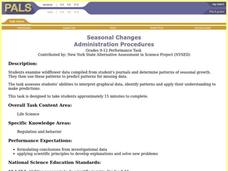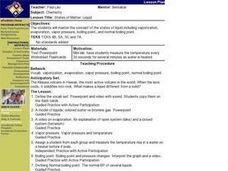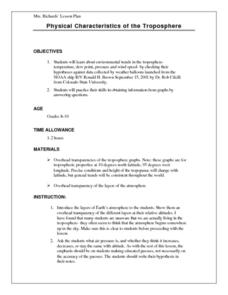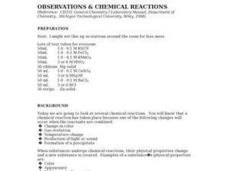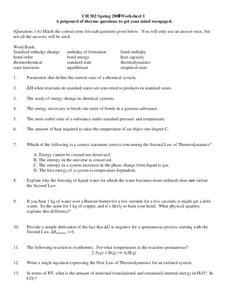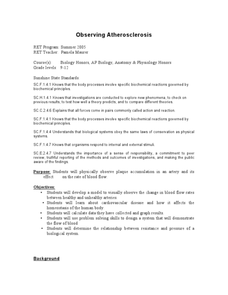Curated OER
The Same but Different Part II
Third graders experiment with beakers of water and balloons to measure the volume of the gas in the balloon. They determine ways to change the volume of air in the balloon which changes its size but not its physical state. By heating the...
Curated OER
Chemical Changes by Gems
Seventh graders observe that heat is produced when two substances are combined. They brainstorm how, and then experiment to find out which of two chemicals created the heat.
Curated OER
Seasonal Changes
Students examine wildflower data compiled from their student journals from the school year. They determine patterns of seasonal growth then use these patterns to predict patterns for missing data.
Curated OER
States of Matter: Liquid
Learners work in a mini lab where they measure the temperature every 30 seconds for several minutes as water is heated. They are asked what makes liquid different from a solid. Students view a PowerPoint on the model of liquids,...
Curated OER
Physical Characteristics of the Troposphere
Students lexplore environmental trends in the troposphere- temperature, dew point, pressure and wind speed- by checking their hypotheses against data collected by weather balloons.
Curated OER
The Physics of Tools
Students investigate the nature and work of simple tools and mechanics.
They explain how each simple machine can be used in real world applications. They explore levers, balance beams, windlasses, wedges, gears, ocarinas, harmonicas,...
Curated OER
National expansion of the United States (1815 to 1850), and its connection to local Illinois history.
Students discuss the importance of establishing the I & M Canal water route. They watch a video about the canal's history. They collect and write a personal migration story by interviewing a family member. They analyze trends and...
Curated OER
America the Beautiful
Students analyze the physical geography of the United States and how we have adapted to or altered the land to create the country we know today. Students complete maps with physical features, states and cities of interest.
Curated OER
Periodic Trends
High schoolers review how physical and chemical change while discussing the properties. They diagram the electron dot for the first four elements in the periodic table. Students identify elements and state what they know while...
Curated OER
What's The Matter?
Fourth graders accurately describe various states of matter, Through experimentation, they change a variable to create a new state of matter. Students record their observations about the way matter is changed and the changes that occur...
Curated OER
Observations & Chemical Reactions
Students conduct a series of experiments in which they explore chemical reactions. They detect chemical changes by observing how physical properties change when two different chemicals are combined. They list and describe the reactants...
Curated OER
The Water Cycle and Global Warming
Students study the flow of water in the environment. In this water cycle lesson students evaluate the consequences of changes in the water cycle using data.
Curated OER
Shape Matters More!
Students investigate shapes as the area changes while the perimeter remains the same. Students demonstrate the shape/perimeter/area relationship using simulations and physical models.
Curated OER
Will it Stretch?
Students explore elasticity and describe the effects of temperature changes on physical properties. For this rubber band stretch lesson students complete an experimental activity and show their results.
Curated OER
Era of Self-Sufficiency - Pre-1890
Students investigate the relationship between physical geography and Utah's settlement. In this Utah land activity, students view a PowerPoint about Utah land and work in groups to answer questions about the uniqueness of Utah's Mormon...
Curated OER
From the Flintstones to the Jetsons
Eighth graders compare and contrast transportation and agricultural methods in the United States from Colonization to Reconstruction. They, in groups, create and present Ohio Memory Scrapbooks to rest of class.
Curated OER
Matter
Third graders are introduced to the topic of matter. As a class, they brainstorm what they already know about matter and its properties. After completing a worksheet, they participate in an experiment in which they observe matter in...
Curated OER
The Meat-Packing Industry in Chicago During the Progressive Era
Students examine maps showing the hog and corn distribution of the United States. In groups, they research the reasons why Chicago became the natural hub for meat-packing processing in the United States. They examine changes in...
Curated OER
Matter
In this matter worksheet, students are given 10 sentences with italicized terms that are wrong. Students correct the terms to appropriately fit the sentences. Topics are related to matter such as physical and chemical properties, solids,...
Curated OER
Solid Water
Students turn solid water (ice) into liquid water. In this solid and liquid water lesson plan, students use water, ice, cups, and heat in order to change water from one state to another. They draw their findings as well.
Curated OER
King of the Mound
Students investigate water as an agent of change. They conduct an experiment involving a mound of soil, observe and record any changes that occur when ice melts on the mound of dirt, and create a drawing of the changes that take place...
Curated OER
Thermodynamics
In this thermodynamics worksheet, students review enthalpy, state functions, bond energy, and heat capacity. This worksheet has 2 multiple choice, 6 matching, and 12 problems to solve.
Curated OER
Unity Versus Diversity
Young scholars explore the 50 State Quarters program and how it represents diversity and unity of the United States. In pairs, they examine quarter designs to gain information about the culture of each state. Students create charts to...
Curated OER
Observing Atherosclerosis
High schoolers develop a model to visually observe the change in blood flow rates between healthy and unhealthy arteries. They calculate data that they have collected and graph their results. They determine the relationships the flow...




